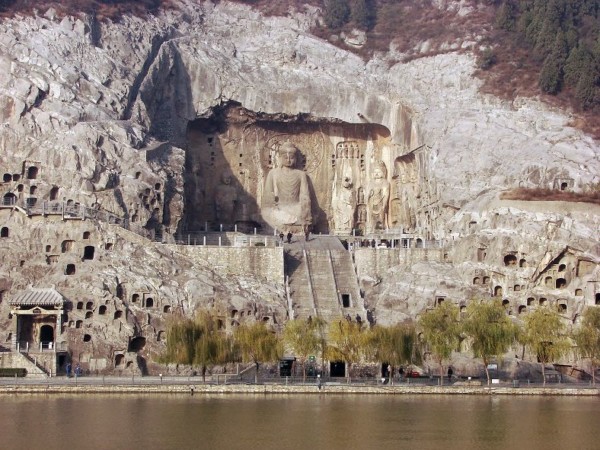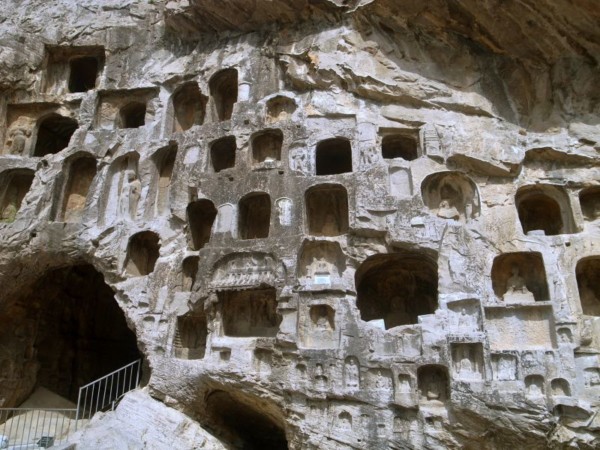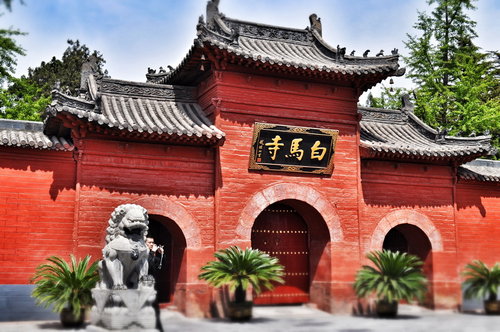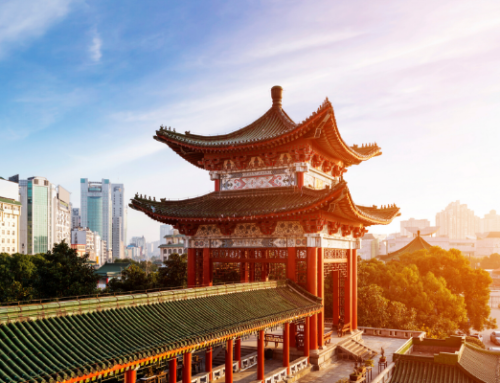If you are looking for a place in China where you can combine your hunger for culture and tradition with satisfying a yearning to explore your spirituality, Henan (河南) is the place for you!
Henan is a fascinating province where old customs and habits meet progress and modernity. Known as “the cradle of Chinese civilization”, the region is a gold mine for those who are interested in Chinese Buddhism, both from philosophical and aesthetic perspectives.
Luoyang’s Buddhist Treasures
Luoyang (洛阳) is an ancient city located in the North-west of Henan province. Capital of 13 historical dynasties, this beautiful city will steal your heart!
Boasting plenty of Buddhist temples and sites, Luoyang attracts thousands of tourists each year. Most visitors to Luoyang are from other parts of China and foreigners therefore often become part of the attraction. You will find many who are happy to take pictures with you and test your Chinese!
The Grottoes of Longmen

Located in the south of Luoyang, the Longmen Grottoes (龙门石窟, Lóngmén shíkū) are among the Buddhist treasures most worth a visit in all of Henan province.
Declared in 2000 as part of UNESCO heritage, these grottoes are considered the finest and most valuable examples of Buddhist parietal art in China.
When the excavation work of these grottoes began in 494 AD, Luoyang was the capital of the Wei dynasty: more than 100,000 images and sculptures representing Buddha and his followers have been built since then.
Some of these amazing art pieces have unfortunately been disfigured during the atrocious anti-Buddhist persecutions (9th century AD) and during the Cultural Revolution (文化大革命, Wénhuà dàgémìng 1966-9), not to mention the corrosive action of atmospheric agents. Nonetheless, this site is still considered an outstanding manifestation of human artistic creativity.
The Longmen Grottoes are distributed along the Western and the Eastern side of the Yi river (伊河, Yī Hé), but the most significant are located on the Westside. Both sides, connected by a long bridge, are crowded at every time of year, so trying to avoid the busiest times of day is the only way to enjoy a privileged view of the 2,345 caves.
Don’t forget to pack some food before starting your visit! Being a holy place, you won’t find any 餐馆 (cānguǎn, restaurants) between one cave and the next.

The White Horse Temple
Despite most of its original structure having been replaced through the years, the White Horse Temple (白马寺, Báimǎ sì) located in Luoyang is known as the first Buddhist temple ever built in China.
Dating back to the first century AD, this monastery is also a symbol of ancient cultural and diplomatic relationship between China and India.
In fact, the story behind the construction of the temple goes that two emissaries from the Han dynasty’s court were sent on a mission to look for some holy Buddhist scriptures. Once they arrived in Afghanistan, they met two Indian Buddhist monks who later decided to go back with them to Luoyang. The legend tells that the two Indian monks used two white horses to carry some Buddhist texts and sculptures. The Chinese emperor, impressed by the kindness of the two monks, ordered the construction of the temple to accommodate them. Today, the White Horse Temple still hosts the relics of the two monks.
Today you can feel the sanctity of this place by simply walking on its grounds. Also you have the unique opportunity to observe the Chinese visitors praying in front of the altars and performing their typical rituals of devotion. With a little bit of luck, you might also be able to meet the young monks living in the White Horse Temple!

Useful Tips
If you have more than three days, bear in mind that Luoyang is not famous only for its Buddhist sites: you can also visit its beautiful Peony Garden, best during the Springtime, and taste some local food in the old town’s many street food areas.
With just 1h30m by train from Luoyang, you’ll also have the opportunity to visit Zhengzhou ( 鄭州, Zhèngzhōu), capital of Henan province. And if your interest in Buddhism has not been completely satisfied, you should also visit the nearby Dengfeng (登封, Dēngfēng ) and its famous Shaolin Temple (少林寺, Shàolín sì), a Buddhist monastery mainly known for being the “holy land” of martial arts.
Are you ready to start your Buddhist trip and chat with local people in Henan?
Click here to choose the course that works for you and learn Chinese with Practical Mandarin!

